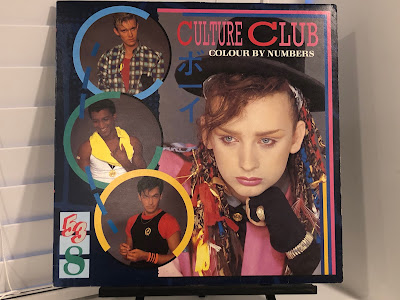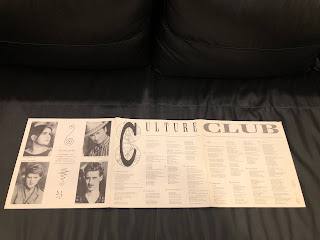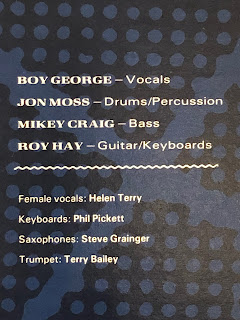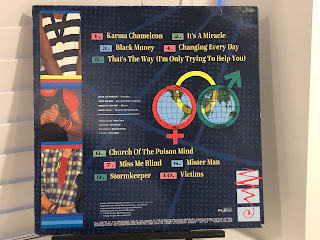You should never say never. Just ask Don Henley. So here I am feeling like I'm betraying my youth by testing to see how thick the ice is now.
Pretty friggin' thick.
This was a day I sort of dreaded, but was expecting. I mean it's not like this wasn't coming. Over the last couple of years I'd put myself through a lot of stuff I never thought I'd actually sit and listen to - let alone actually (begrudgingly) admit to enjoying.
It was musical hell when a song from Culture Club came on the radio. I never expected that to change ... ever. Still, a lot of things have frozen over, or at least chilled enough to numb the pain these albums once brought to my ears.
Adrian, who runs my favourite record store and feeds my habit, had been trying to cleanup and refresh some inventory and he went a little nuts on the bargain bins - especially the dollar section. I'd popped in just to say hi and see what was up - and in short order I had over a dozen records, and among them was a nearly mint copy of Culture Club's 1983 follow up to Kissing to Be Clever, the one that didn't want to hurt me but did anyway.
Once upon a time in the early '80s, Culture Club were everywhere. I mean they were huge. It was hard to listen to the radio because you never knew when one of their irritating singles would come on and almost cause an accident as I tried to change the station before the singing would start. I had a few near misses but mostly managed to maintain a pretty healthy disdain for the band.The band made a pretty big splash with their debut, and in their native UK it sold 300,000 units and did similar numbers here in Canada. In the US it went platinum and laid the ground work for Colour By Numbers. On the strength of "Karma Chameleon" the album would explode. It sold a 1,000,000 copies in Canada, almost as many in the UK, and it went 4X platinum in the US. Over 10,000,000 copies world wide. Love 'em or hate 'em (I hated 'em) that's a lot of plastic (thank you Wikipedia for the numbers).
Then it was over. They were irrelevant as quickly as they stormed onto the scene. Boy George with his (then) outrageous appearance and androgynous persona was a cultural phenomena that fizzled as quickly as it ignited. This was one of those times I actually agreed with Neil Young's "better to burn out than fade away" observation on pop relevance. It's weird to think that in 1983 Boy George was only 22 and was still really just a kid. I can't imagine the pressure these guys must have been under at the time.
It would be years before I'd gain an appreciation for Boy George as a vocalist. It was his version of "The Crying Game" from the movie of the same name, that I found really good. I'd hear the occasional Culture Club song on the radio, and wouldn't always change the channel.
The rest was actually pretty intricate pop, with some jazz, soul, folk and funk elements meshed together. It was different enough to stand on it's own, but likely would have been lost among the other pop bands at the time who were in similar territory. So Boy George really was the secret sauce - be outrageous, get people's attention, and then deliver the goods to keep it. It was a double edged sword that ultimately pigeonholed the band as a novelty act and belied the actual talent of the band.
Heck I will even admit that "Miss Me Blind" is a pop song I shouldn't like, but there was something about it, that just worked. The album's closer "Victims" is a simple piano driven ballad with accompanying strings, that while pretty generic, is also a poignant song that must have felt like a bait and switch to some listeners. Maybe there was more going on here than the cover would lead you to believe.
The songs were written and performed by the band, which was actually pretty cool.
- Boy George (George Alan O'Dowd) - vocals
- Jon Moss - drums / percussion
- Mikey Craig - bass
- Roy Hay - guitar / keyboards
For an album that could have devolved into a processed keyboard and drum machine sterile pop album, the organic nature of their arrangements that leaned heavily on horns and acoustic instruments has actually served to keep this sounding surprisingly fresh. Oh it's dated, but it still sounds good. The album was produced by Steve Levine, and was mixed by Steve and Jon Moss.
While I will never be a big fan, there were some songs here that I
really enjoyed. "Miss Me Blind" was surprising. Also the level of
musicianship was better than I had expected, and the ever present
counter vocals of Hellen Terry are top shelf.





Comments
Post a Comment